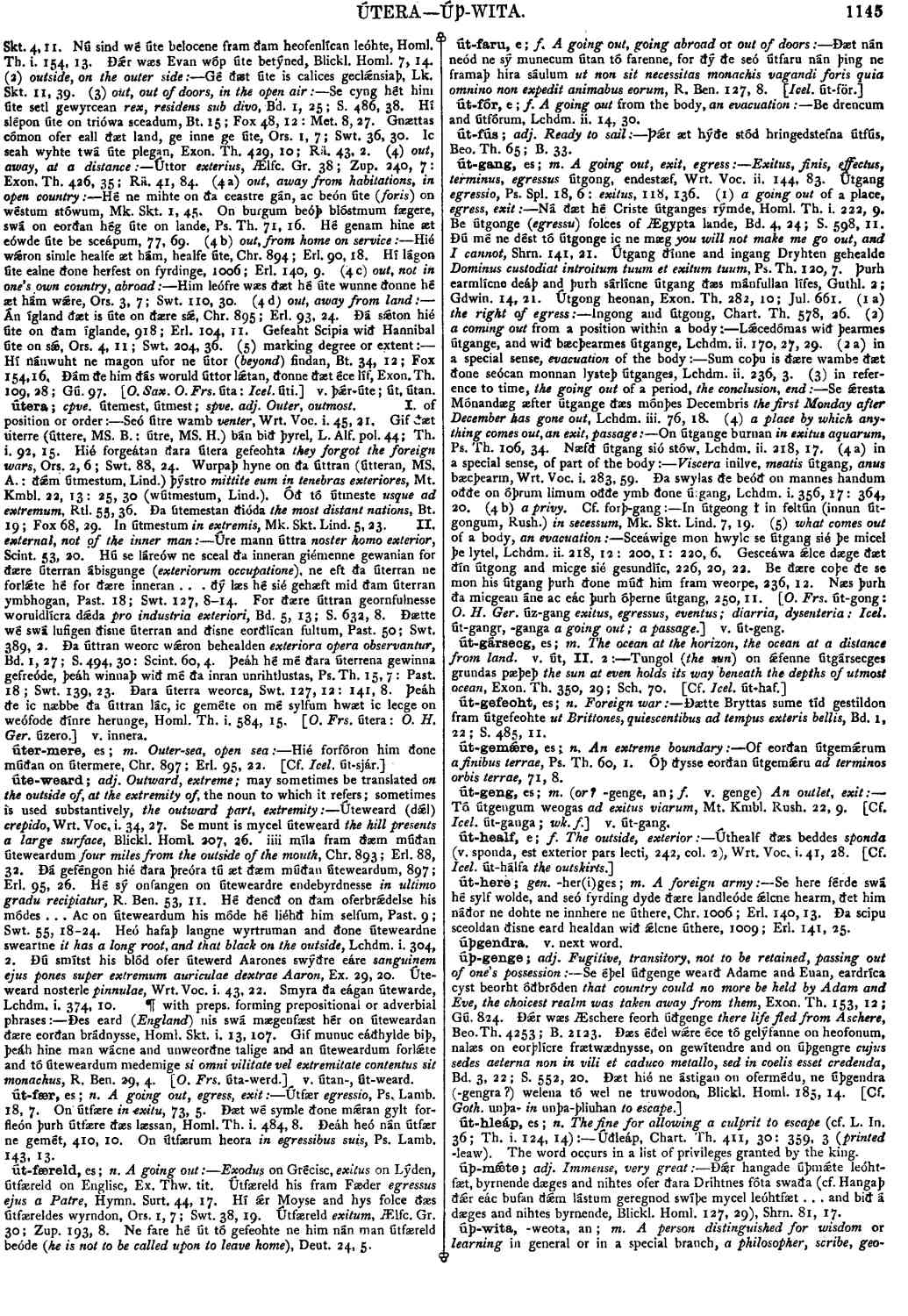úþ-wita
- noun [ masculine ]
-
Se gomola, eald úðwita (cf. fród fæder módsnottor 300,
- 4; Fä. 1), Exon. Th. 304, 6; Fä. 66.
-
Uðweota
a councillor, senator,
- Andr. Kmbl. 2211; An. 1107.
-
Úðuuta
philosophus,
- Wrt. Voc. ii. 117, 24.
-
Cato wæs openlíce úþwita,
- Bt. 19; Fox 70, 8: Met. 10, 50.
-
Epicurus se úþwita,
- Bt. 24, 3; Fox 84, 21, Úre úþwita Plato, 33, 3; Fox 126, 35: 35, 1; Fox 156, 9: Met. 22, 54.
-
Úðwita
sophista,
- Ælfc. Gr. 7; Zup. 24, 8.
-
Gleáwum úðwitum and getincgum gymosophistis et rhetoribus, úðwita
gymnosophista,
- Hpt. Gl. 479, 6-9.
-
Án swíþe wís mon ongan fandigan ánes úþwitan and hine bismerode, for ðam hé hine swá orgellíce up áhóf and bodode ðæs ðe hé úðwita (
philosophus
) wǽre; ne cýððe hé hit mid nánum cræftum ... Ðá wolde se wísa mon his fandigan, hwæðer hé swá wís wǽre swá hé self wénde ðæt hé wǽre,- Bt. 18, 4; Fox 66, 27-33.
-
Án úðuutta
unus scriba,
- Mt. Kmbl. Lind. 8, 19.
-
Úðwitan
sophistae,
- Hpt. Gl. 449, 46.
-
Ðá clypode se apostol ðone úðwitan Graton,
- Homl. Th. i. 60, 31.
-
Ðæs ðe ús secgaþ béc, ealde úðwitan (historians), Chr. 937; Er1.115, 18:
astronomers,
- Menol. Fox 329; Men. 166.
-
Úþwitan (
philosophers
) secgaþ ðæt sió sáwul hæbbe ðrió gecynd,- Bt. 33, 4; Fox 132, 3; Met, 20, 184: Homl. Skt. i. 1, 96.
-
Úðweotan (
the Jewish scribes and elders
),- Elen. Kmbl. 943; El. 473.
-
Úðwuta
scribae,
- Mt. Kmbl. Lind. 15, 1.
-
Úðuta (-wutu,
- Rush.), Mk. Skt. Lind. 1, 22.
-
Úðwutto (-wuta,
- Rush.), Lk. Skt. Lind. 22, 66.
-
Swá swá úþwitena gewuna is
ut geometrae solent,
- Bt. 34, 4; Fox 138, 28.
-
Sume of úðuutum (-wutum, Rush.)
quidam de scribis,
- Mk. Skt. Lind. 7, 1.
-
Wǽ iúh uuðutum,
- Mt. Kmbl, Lind. 23, 29.
-
Ic sende tó iúh wítgo and snotre menu and úðuto (
scribas
),- 23, 34.
-
Úðwiotan his
seniores suos,
- Ps. Surt. 104, 22: 118, 100.
Bosworth, Joseph. “úþ-wita.” In An Anglo-Saxon Dictionary Online, edited by Thomas Northcote Toller, Christ Sean, and Ondřej Tichy. Prague: Faculty of Arts, Charles University, 2014. https://bosworthtoller.com/34141.
Checked: 0